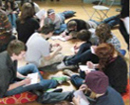|
    
English material
- key stage 3
English - looking at memorials and epitaphs: Teachers notes
These activities relate to the following areas in the Programme of Study for KS3:
Competence
- Reading and understanding a range of text and responding appropriately.
- Being adaptable in a widening range of familiar and unfamiliar contexts within the classroom and beyond.
Creativity
- Making fresh connections between ideas, experiences, texts and words, drawing on a rich experience of language and literature.
Cultural Understanding
- Gaining a sense of the English literary heritage and engaging with important texts in it.
Reading
Reading for meaning
- extract and interpret information, events, main points and ideas from texts
- infer and deduce meanings, recognising the writers’ intentions
- assess the usefulness of texts, sift the relevant from the irrelevant and distinguish between fact and opinion
- recognise and discuss different interpretations of texts, justifying their own views on what they read and see, and supporting them with evidence
- understand how the nature and purpose of texts influences the selection of content and its meanings
Writing
Composition
- write clearly and coherently, including an appropriate level of detail
- write imaginatively, creatively and thoughtfully, producing texts that interest and engage the reader
- generate and harness new ideas and develop them in their writing
- adapt style and language appropriately for a range of forms, purposes and readers
- use imaginative vocabulary and varied linguistic and literary techniques to achieve particular effects
- use clearly demarcated paragraphs to organise meaning
- use complex sentences to extend, link and develop ideas
- vary sentence structure for interest, effect and subtleties of meaning
- consider what the reader needs to know and include relevant details
- use planning, drafting, editing, proofreading and self-evaluation to shape and craft their writing for maximum effect
- summarise and take notes
- write legibly, with fluency and, when required, speed.
Range and Content
Writing
- develop ideas, themes, imagery, settings and/or characters when writing to imagine, explore and entertain
- analyse and evaluate subject matter, supporting views and opinions with evidence
- present ideas and views logically and persuasively
- explain or describe information and ideas relevantly and clearly.
The forms for such writing should be drawn from different kinds of:
stories, poems, play scripts, autobiographies, screenplays, diaries, minutes, accounts, information leaflets, plans, summaries, brochures, advertisements, editorials, articles and letters conveying opinions, campaign literature, polemics, reviews, commentaries, articles, essays and reports
Particular thanks to Jane Lewis for creating these resources. |